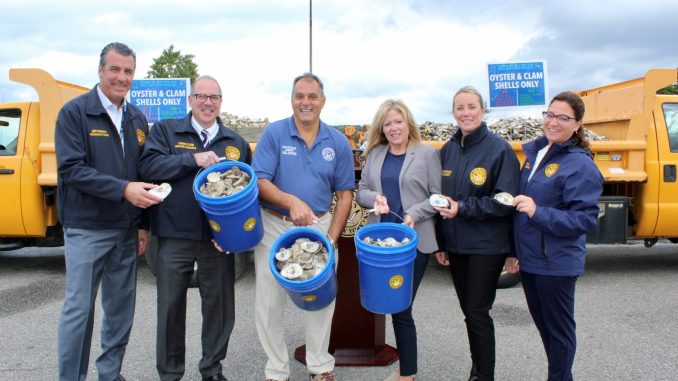
By Kelly Alvarado
The Town of Oyster Bay is replenishing its waters with millions of clam fish seedlings and recycling oyster shells to reduce waste and improve water quality.
About two million baby clam seedlings have been released into the Great South Bay by Town of Oyster Bay officials to help increase the shellfish population.
“We are pleased to officially bring our highly successful seeding program to south shore waters, as we disperse these seeds that were grown right in our own Shellfish Hatchery,” Town Supervisor Joseph Saladino said.
The seedlings are just two millimeters in size when they first start out in the Town’s Shellfish Hatchery. After close monitorization, they reach 15-20 millimeters, the ideal size for seeding the waterways. These seedlings are then placed strategically to help repopulate the shellfish harvesting population. Additionally, it will clean and filter the waterways.
“We’ve successfully placed more than 10 million shellfish into our waterways each year, thanks largely in part to our great Shellfish Hatchery, helping to strengthen the local economy and keep our waters clean,” Councilwoman Michele Johnson said.
Town officials also recently passed the Town’s Shell Recycling Program. This initiative encourages oyster shells to be recycled and placed back into the water, like those collected from the Town of Oyster Bay’s Oyster Festival.
Collected shells are brought by the Town’s aquaculturists to a nearby curing facility. There, they remain for several months before being strategically returned to the harbor to assist in the growth of new shellfish.
The shells provide a natural habitat for young shellfish to grow with protection from weather conditions and predators while simultaneously improving water quality. According to the National Centers for Coastal Ocean Sciences, a single shellfish can filter up to 50 gallons of water a day.
“Shellfish belong in the bay,” said Robin Silvestri, executive director of Save the Great South Bay, a local nonprofit. “It’s their home. Their existence in the bay can only serve to improve water quality.”
Human activities create lots of excess nutrients, like nitrogen and phosphorus, and other sediments that negatively impacts water quality and disrupts the natural balance that is required for a healthy ecosystem. Oysters have filter-feeding capabilities that remove excess nutrients and help enhance water quality.
According to Silvestri, the Great South Bay’s water quality is in dire condition. “There have been several harmful algal blooms this year alone,” Silvestri said. “Shell recycling programs such as this one help support shellfish restoration programs by providing a base for spat on shell and/or recreating reefs.”
For more information about the shell recycling program, visit www.oysterbaytown.com/shellrecycling.

